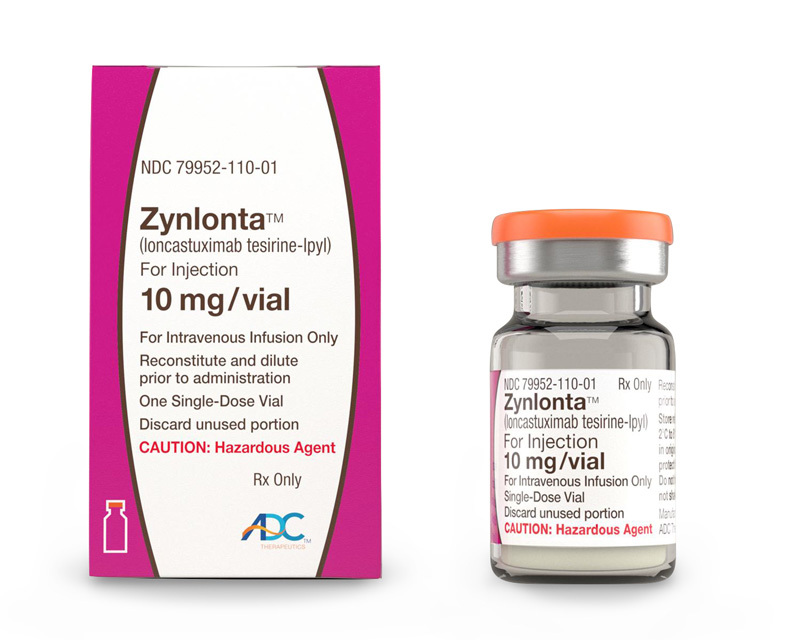Keytruda (pembrolizumab) vs Zynlonta (loncastuximab tesirine-lpyl)
Keytruda (pembrolizumab) vs Zynlonta (loncastuximab tesirine-lpyl)
Keytruda (pembrolizumab) is an immune checkpoint inhibitor that works by blocking the PD-1 pathway, which helps the body's immune system to detect and fight cancer cells, and is commonly used in various types of cancers including melanoma, non-small cell lung cancer, and head and neck cancers. Zynlonta (loncastuximab tesirine-lpyl) is an antibody-drug conjugate specifically targeting CD19, a protein found on the surface of certain cancer cells, and is used in the treatment of relapsed or refractory diffuse large B-cell lymphoma. The choice between Keytruda and Zynlonta would depend on the specific type of cancer a patient has, the stage and specific characteristics of their disease, and their overall health, as each medication is tailored for different indications and mechanisms of action.
Difference between Keytruda and Zynlonta
| Metric | Keytruda (pembrolizumab) | Zynlonta (loncastuximab tesirine-lpyl) |
|---|---|---|
| Generic name | Pembrolizumab | Loncastuximab tesirine-lpyl |
| Indications | Various cancers including melanoma, non-small cell lung cancer, head and neck squamous cell carcinoma, classical Hodgkin lymphoma, primary mediastinal large B-cell lymphoma, urothelial carcinoma, microsatellite instability-high cancer, gastric cancer, esophageal cancer, cervical cancer, hepatocellular carcinoma, Merkel cell carcinoma, renal cell carcinoma, endometrial carcinoma, and tumor mutational burden-high cancer. | Relapsed or refractory diffuse large B-cell lymphoma (DLBCL). |
| Mechanism of action | Programmed death receptor-1 (PD-1) blocking antibody. | Antibody-drug conjugate targeting CD19, a protein expressed on the surface of B-cells, followed by delivery of a cytotoxic agent. |
| Brand names | Keytruda | Zynlonta |
| Administrative route | Intravenous infusion | Intravenous infusion |
| Side effects | Fatigue, musculoskeletal pain, decreased appetite, pruritus, diarrhea, nausea, rash, pyrexia, cough, dyspnea, constipation, pain in extremity, and headache. | Thrombocytopenia, neutropenia, anemia, fatigue, musculoskeletal pain, edema, nausea, and fever. |
| Contraindications | Individuals with a history of severe hypersensitivity reaction to pembrolizumab or any of its excipients. | Individuals with a history of severe hypersensitivity to loncastuximab tesirine-lpyl or any of its components. |
| Drug class | Anti-PD-1 monoclonal antibody | Antibody-drug conjugate |
| Manufacturer | Merck Sharp & Dohme Corp., a subsidiary of Merck & Co., Inc. | ADC Therapeutics SA |
Efficacy
Efficacy of Keytruda (pembrolizumab) in Lymphoma
Keytruda (pembrolizumab) is a monoclonal antibody that has shown efficacy in the treatment of various types of cancer, including lymphoma. Pembrolizumab targets and blocks the PD-1 receptor, a protein on T cells that normally helps keep these cells from attacking other cells in the body. By blocking PD-1, Keytruda boosts the immune response against cancer cells. In the context of lymphoma, Keytruda has been studied in patients with relapsed or refractory classical Hodgkin lymphoma (cHL) and has demonstrated significant efficacy in shrinking tumors and, in some cases, leading to complete remission.
Studies have shown that Keytruda can induce a durable response in a subset of patients with cHL, particularly those who have failed to respond to previous treatments. The overall response rate (ORR) in these studies has been reported to be around 65-70%, with a complete remission rate of about 20-30%. However, it is important to note that the response to Keytruda can vary, and not all patients with lymphoma will experience the same level of benefit.
Efficacy of Zynlonta (loncastuximab tesirine-lpyl) in Lymphoma
Zynlonta (loncastuximab tesirine-lpyl) is an antibody-drug conjugate specifically designed for the treatment of certain types of B-cell lymphomas. It works by targeting CD19, a protein expressed on the surface of B-cells, and delivering a cytotoxic agent directly to the cancer cells. Zynlonta has shown promise in treating relapsed or refractory diffuse large B-cell lymphoma (DLBCL), which is the most common type of non-Hodgkin lymphoma.
In clinical trials, Zynlonta has demonstrated significant efficacy in patients with DLBCL who have failed multiple prior lines of therapy. The ORR for Zynlonta in pivotal trials was approximately 48.3%, with a complete remission rate of 24.1%. These results indicate that Zynlonta can provide a meaningful therapeutic option for patients with limited treatment choices. As with any therapy, the efficacy of Zynlonta can vary among individuals, and ongoing research continues to better understand which patients are most likely to benefit from this treatment.
Regulatory Agency Approvals
Keytruda
-
European Medical Agency (EMA), European Union

-
Food and Drug Administration (FDA), USA

-
Health Canada

-
Therapeutic Goods Administration (TGA), Australia

-
Medsafe (NZ)

Zynlonta
-
European Medical Agency (EMA), European Union

-
Food and Drug Administration (FDA), USA

Access Keytruda or Zynlonta today
If Keytruda or Zynlonta are not approved or available in your country (e.g. due to supply issues), you can access them via Everyone.org.
How it works

Make an enquiry
Choose the medicine you want to buy, answer a couple of questions, and upload your prescription to speed things up. We’ll get back to you within 24 hours.


Make an enquiry
Choose the medicine you want to buy, answer a couple of questions, and upload your prescription to speed things up. We’ll get back to you within 24 hours.


Breeze through the paperwork
We'll guide you through the required documents for importing unapproved medicine, ensuring you have all the necessary information.


Get a personalized quote
We’ll prepare a quote for you, including medicine costs and any shipping, administrative, or import fees that may apply.


Receive your medicine
Accept the quote and we’ll handle the rest - sourcing and safely delivering your medicine.

Some text on this page has been automatically generated. Speak to your physician before you start a new treatment or medication.
Let's talk
If you have any questions, call us or send us a message through WhatsApp or email:
Contact us




